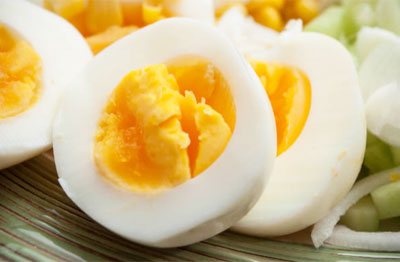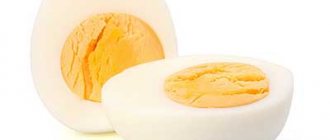Hard boiled eggs go great in salads and can be eaten on their own with salt and pepper.
Here's everything you need to know about hard-boiled eggs.
Hard boiled egg - calories, nutritional value and health benefits
Nutritional value, composition and calorie content
A hard-boiled egg is rich in nutrients, protein and healthy fats. One large hard-boiled egg (50 grams) contains (as a % of the recommended daily intake) (1):
- Calorie content : 77.5 kcal (4%).
- Carbohydrates : 0.6 g (0%).
- Fat : 5.3 g (8%).
- Protein : 6.3 g (13%).
- Vitamin A : 293 IU (6%).
- Riboflavin : 0.3 mg (15%).
- Folate : 22 mg (5%).
- Vitamin B12 : 0.6 mcg (9%).
- Pantothenic acid : 0.7 mg (7%).
- Phosphorus : 86 mg (9%).
- Selenium : 15.4 mg (22%).
- Cholesterol : 212 mg (71%).
- Omega-3 fatty acids : 39 mg.
- Omega-6 fatty acids : 594 mg.
One large hard-boiled egg also contains trace amounts of vitamins and minerals such as vitamin E, vitamin K, thiamine, vitamin B6, betaine, calcium, iron, magnesium, potassium, sodium, zinc and manganese.
Despite the huge amount of nutrients contained in hard-boiled eggs, this product is a fairly low-calorie food. One hard-boiled egg contains only 77 calories, 5 grams of fat and very few carbohydrates.
One large hard-boiled egg also contains a decent amount of protein, with over 6 grams.
In addition, eggs contain a complete set of amino acids, which means they are a complete source of protein.
Hard-boiled eggs also contain a variety of important nutrients, including vitamin D, zinc, calcium and all B vitamins. They are a particularly good source of riboflavin (vitamin B2) and vitamin B12.
Many of the nutrients in eggs are found solely in the yolk, while egg whites contain mostly protein (2).
Summary:
One large hard-boiled egg (50g) is low in calories and rich in many important vitamins, minerals and nutrients. While the yolk provides your body with nutrients, fats, and protein, the egg white contains mostly protein.
Composition of boiled eggs
Moreover, the components of a chicken egg differ in both their taste and composition. In addition, the yolk and white are used in cooking not only together, but also separately. In cooking, chicken eggs are subjected to various types of heat treatment. Most often, eggs are boiled, fried, and also used raw as an ingredient in drinks, as well as culinary products, baked goods and sweets.
At its core, boiled eggs are heat-treated food products that are used as an independent dish or as an integral component of soups, main courses, as well as salads and appetizers. Often, the distinctive taste and consumer properties of boiled eggs are used as a filling in the process of preparing baked goods, as well as stuffed meat or fish culinary products.
The composition of boiled eggs contains many compounds beneficial to the human body. For example, the composition of boiled eggs is enriched with manganese, iodine, zinc, iron, sodium, potassium, calcium, selenium, as well as vitamins A, B, E, D, K and PP. The calorie content of boiled eggs depends primarily on the type of product. However, the average caloric content of boiled eggs is 159 kcal, which is per 100 grams of product.
Excellent source of high quality protein
Protein is vital to your health, including muscle and bone growth, and the production of hormones and enzymes (3).
One large hard-boiled egg provides your body with approximately 6 grams of high-quality protein. In fact, eggs are one of the best sources of protein (1).
This is due to the fact that they contain a full range of essential amino acids (3, 4).
One common misconception is that protein is only found in egg whites.
However, nearly half of egg white content comes from the yolk (5, 6).
Therefore, it is best to eat the egg with the yolk - this will give you the opportunity to get all the nutrients contained in the egg that are important for your body.
Summary:
Eggs are an excellent source of protein. They contain all nine essential amino acids, and the egg white and yolk contain almost equal amounts of high-quality protein.
Eggs - beneficial properties
Several decades ago, American scientists discovered a high cholesterol content in eggs. In this regard, the majority of people who adhere to a healthy diet declared this product taboo and stopped consuming it.
At that time, scientists poorly understood the effect of cholesterol on the body, and also did not divide it, as now, into “beneficial” and “harmful”. But such a taboo on eggs did not lead to the expected effect.
Therefore, scientists decided to reconsider their decision and repeated experiments helped discover a very useful substance in the egg - lecithin. Since cholesterol and lecithin in the egg yolk are contrasting values, there is no harm from this product to humans.
An egg is a very good means of preventing atherosclerosis.
The benefits of boiled eggs can be considered in two ways:
- protein;
- yolk.
Egg white is in no way inferior in properties to meat or milk. Its amazing properties have been proven by many studies. It is chicken protein that is absorbed by the body quickly and completely, which brings great benefits to it. Thanks to eating eggs, you can restore strength after almost any illness, as well as strengthen the immune system.
Eggs are very useful for athletes, because by eating several eggs daily, you can quickly build muscle mass. Protein is also recommended for all teenagers and children during their active growth.
The yolk contains a lot of useful elements: lecithin, biotin and choline. In addition, it contains a huge amount of vitamins. Mainly these are vitamins A, B, E.
The yolk is also rich in calcium, potassium, iron and phosphorus. It is known that phosphorus has a very good effect on the nervous system and the development of the cerebral cortex.
Cholesterol level
For many years, eggs have had a bad reputation due to their high levels of cholesterol.
It's true that eggs contain a lot of cholesterol. One large hard-boiled egg contains 212 mg of cholesterol, which is 71% of the RDA (1).
However, recent studies show that dietary cholesterol has very little effect on blood cholesterol levels (7, 8).
For most people, dietary cholesterol is not associated with cardiovascular disease risk and does not increase total cholesterol or “bad” LDL cholesterol (9, 10).
In fact, consuming eggs may improve your levels of “good” HDL cholesterol (7, 11, 12).
Additionally, two studies that examined data from more than 100,000 healthy adults found that eating one whole egg per day was not associated with an increased risk of cardiovascular disease (12).
However, people with diabetes should exercise caution when consuming eggs, as some studies suggest that eating 7 eggs per week may increase the risk of developing cardiovascular disease (13).
Ultimately, more research is needed on the relationship between egg consumption and the risk of cardiovascular disease in people with diabetes.
Summary:
Although hard-boiled eggs are high in cholesterol, research shows that dietary cholesterol does not negatively affect blood cholesterol levels in most people. Eggs have been found to improve cholesterol profiles by increasing levels of "good" HDL cholesterol.
Improves brain and eye health
Eggs provide your body with important essential nutrients and antioxidants that support brain and eye health.
Kholin
Choline is an essential nutrient for many critical processes in your body.
Your body does produce some choline, but not in large quantities. Therefore, you should get choline from your diet to avoid deficiency (14).
However, most people today do not consume enough of it (15, 16).
Choline is critical to maintaining a healthy nervous system as it helps produce acetylcholine, a neurotransmitter involved in memory and learning (17).
Choline is important throughout your life. It promotes fetal brain development and memory, as well as cognitive function in older adults (15, 18).
It is also vital for pregnant women, as adequate choline levels may reduce the risk of neural tube defects in the fetus (19).
Choline is found in the yolk - one large hard-boiled egg contains 147 mg of choline, which is 27% of the daily value. In fact, eggs are the most concentrated source of choline (14, 15).
Lutein and Zeaxanthin
Lutein and zeaxanthin are two antioxidants best known for their role in eye health.
They fight the harmful effects of free radicals that can accumulate in your eyes (20, 21).
Lutein and zeaxanthin have been shown to slow the development of cataracts and protect against age-related macular degeneration (macular degeneration) (22, 23).
They may even protect your eyes from harmful blue light (24, 25).
Egg yolks are an excellent source of these two carotenoids.
Plus, thanks to the fat contained in the yolk, your body seems to absorb lutein and zeaxanthin very well (26, 27).
Summary:
Egg yolks are an excellent source of choline, which is essential for brain health and development. They are also rich in lutein and zeaxanthin, antioxidants that promote eye health.
Hard-boiled or fried egg: Which is better?
Hard-boiled eggs are made by placing unshelled eggs in a pan filled with cold water, then boiling them until the yolk is set. They are prepared without adding oil.
On the other hand, the process of cooking fried eggs requires the addition of vegetable oil, which adds additional calories and fat.
For example, one large hard-boiled egg contains 77 calories and 5.3 grams of fat, compared to 90 calories and 7 grams of fat in one large fried egg (1, 28).
Besides their fat and calorie content, boiled and fried eggs have very similar vitamin and mineral profiles. They do not differ in the amount of protein and nutrients.
Summary:
While hard-boiled eggs are cooked without additional ingredients, fried eggs require the addition of oil, which makes them higher in calories. However, fried and boiled eggs are very similar in composition.
What kind of eggs can you eat?
Let's take a short overview of the modern “egg” market. You can start with goose eggs: it is believed that people tamed geese about 10,000 years ago, and learned to get from them not only meat and fluff - their eggs are very high in calories and nutritious. One egg weighs about 200 g - this is almost a complete meal for an adult, but you cannot eat it raw, and you need to cook it for a long time - at least 15 minutes. Geese lay few eggs, and you cannot buy them in a regular store, but you can find a manufacturer and take eggs from him. Before cooking, goose eggs are washed very thoroughly - preferably with warm running water and soap.
Why I love my robot vacuum cleaner so much: sharing my own experience
Duck eggs are smaller than goose eggs, but larger than chicken eggs - about 90-100 g, and they are also eaten only after thorough washing and heat treatment - boiled for at least 13 minutes. Duck eggs are delicious and perfectly filling; They decorate salads and add color to baked goods - their yolks are very bright. Ducks lay eggs more often than geese, but less often than chickens, and buying their eggs is also not easy.
Turkey eggs are considered more tasty and healthier than chicken eggs, but they are even rarer - after all, turkeys are raised as a “meat” bird.
But ostrich eggs used to be exotic in Russia, but now they are becoming common, although these birds are raised for meat: we have more and more ostrich farms - ostriches live well in cold climates. One ostrich egg is enough for lunch for ten people: these eggs weigh about 2 kg, their diameter can reach 20 cm, and they need to cook for about 45 minutes, so it’s customary to fry them - it’s easier.

In Russian supermarkets you can freely buy quail eggs: they contain several times more vitamins and minerals than chicken eggs; they are considered medicinal and rarely become infected with salmonellosis. Cook them for no more than 3-4 minutes: overcooked quail eggs become “rubbery” and tasteless.
In recent years, Russian farmers have begun to breed guinea fowl, strong and agile birds of the gallinaceous order. Their eggs are smaller, but in many respects they are more profitable than chicken eggs: they have a strong shell, they are stored for a long time, contain little cholesterol and do not cause allergies. You can safely eat them not only soft-boiled and in a “bag,” but also raw: salmonella almost never gets into them, thanks to the thickness of the shell.
Exotic eggs in Russia include not only the eggs of snakes, turtles and wild birds, but also the eggs of ordinary pigeons. It is better to eat them hard-boiled; they are rich in minerals (especially iron); their consumption can improve vision, bone and skin condition, help the development of young children and improve the composition of the milk of nursing mothers. Cooks from France and China often add them to various dishes; Here you can buy them “to order” from breeders, but they are not cheap.
Summarize
- A hard-boiled egg is a low-calorie, nutrient-rich food.
- Eggs are an excellent source of high-quality protein and are rich in B vitamins, zinc, calcium and other important nutrients and antioxidants such as choline, lutein and zeaxanthin.
- Despite their high cholesterol levels, eggs do not appear to increase the risk of heart disease in most people.
- Boiled eggs are cooked without adding oil, so they contain fewer calories and fat than scrambled eggs.
- They can be one of the easiest and healthiest foods to add to your diet.
Eggs











